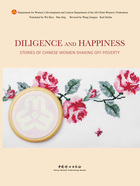
Prosperity Through Folk Tourism of China’s “Hometown of Reindeer”
Bu Dongxia, Aoluguya Ewenki Town, Genhe City, Inner Mongolia Autonomous Region

People in Aoluguya, the hometown of both Chinese reindeer and the last hunting tribe in China, still live a safari life with reindeer. Their unique folk customs make Aoluguya quaint and mysterious. Thanks to rapid development in local transportation and tourism, large numbers of tourists from China and abroad come to Aoluguya, hoping to get a close look at the original ecological civilization and simple, pure customs given by nature. Seizing the favorable opportunity, the Genhe municipal committee and Genhe government, along with the Party Committee of Aoxiang Village, vigorously encouraged and assisted local hunters to get engaged in tourism service industry, including building tourism product stores and developing tours given by local families.
Bu Dongxia, a woman with middle school-level education, noticed the trend and responded to the government’s policy. She actively acquired tourism-related knowledge, such as the relevant policies, cultural etiquette, publicity, economic interests and so on. In 2008, in order to truly make use of the Aoluguya Ewenki Town’s advantage as China’s last hunting tribe, she took the lead in launching a folk custom family tour.
Her tourist spot, 30 kilometers from the nearest urban area, features a beautiful natural environment—a sea of trees, brimming with oxygen. She created a website called “The Scenic Tourist Attraction of Aoluguya Ewenki”, with a plethora of beautiful pictures and informative texts to inform people all over the world about the beauty and uniqueness of Aoluguya and attract more tourists with its folk culture. Thanks to the good publicity provided by the internet, a large number of tourists were enticed to visit in 2008, bringing an income exceeding 20,000 yuan. Now, the number of tourists per year keeps increasing. During the peak season, the maximum number of tourists in a day can reach more than 300.
In order to better provide high-quality services for tourists and further improve the folk hunter aspect of the folk tour, Bu actively participated in various types of tourism training classes and folk culture knowledge lectures, and applied the acquired knowledge to the application of folk tourism. When visitors come to her hunter’s camp, they will firstly be greeted by Bu wearing a unique ethnic costume and enjoy her warm hospitality. During the tour, there are various activities. You can get in real contact with the reindeer to experience the original lifestyle of the people in Aoluguya; you can buy local deer products and unique souvenirs; you can live with hunters and dance with them around the bonfires; you can bake venison and bread, and taste deer milk and dried venison; you can learn from hunters to make traditional handicrafts; you can pick more than 30 kinds of wild fruits and wild mushrooms such as red beans and blueberries; you can venture into to the depths of the forest to search for mysterious reindeer.
Bu’s promising business brought with it a busier life. Though she felt tired every day, she found her efforts worthwhile with rich income and an enriched life.
In fact, since graduating from middle school, Bu has devoted her youth and love to her hometown and her dear “friends”—reindeer. The over 1,000 reindeer in Aoxiang Village are the only reindeer group in China. The reindeer feed on moss and can only survive in the mountains. Therefore, hunters have preserved eight camps for reindeer-raising after moving down the mountains, including Bu’s camp. Bu loves reindeer as her own children. She dislikes summer because reindeer will suffer many bites from mosquitoes, especially those that have just had the antlers cut off—if the open wound is bitten by mosquitoes, it can easily fester. Bu’s reindeer are close to her. Whenever she puts her hand over her mouth and shouts, the reindeer will come and surround her with the ringing of their bells.
After the establishment of the tourist spot, Bu and 17 hunters from Aoxiang Village have designed, produced and sold cultural, memorable and unique ethnic souvenirs with the help of the government and All-China Women’s Federation. Products include sun flower ornaments, ethnic costumes and buckskin gloves full of Ewenki cultural elements, which are widely popular for their distinctive features. These souvenirs not only spread their ethnic culture, but also generate more income for local hunters.

While caring for her own business, Bu never forgets the other hunters in her hometown and actively shares her experience of starting a business in tourism. Under her leadership, more than 20 hunters from three hunter camps have benefited from folk tourism. She leads hunters to develop a series of brand trademarks using ethnic cultural tourism, catering, service, etc. She supports the underprivileged local people in developing a courtyard-style economy and contributes to many areas of operation, such as the reindeer products, forest tourism, simulated hunting, ethnic dining, villa-style tourist service centers and so on.
Having engaged in tourism business for many years, Bu always adheres to the principle of “treating people with sincerity and warm hospitality”, thus contributing to her good reputation. In 2010, Bu was elected as the “Outstanding Representative in Family Tourism” in Hulun Buir. In 2012, the “Expert in Prosperity” program in China Central Television interviewed Bu and shared her experience of attaining prosperity with more people.
When it comes to the future, Bu still has many plans and goals. With diligence and hard work, she hopes to make great contributions to the development of ethnic culture and tourism in Aoluguya Ewenki Town.
Text & Photo / Inner Mongolia Autonomous Region Women’s Federation
